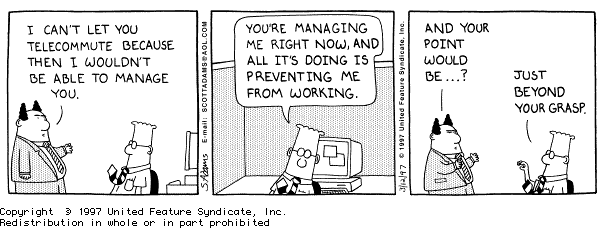Friday, April 12, 2019
Monday, April 08, 2019
Anywhere Competes With Silicon Valley, Bangalore, Beijing And London
The next tech hub? Anywhere
This is an interesting development. The trend should only grow larger. The thing about casual clothes is if you wear them like a uniform, that defeats the purpose. Remote work and distributed teams have not made the office obsolete. I believe there is a tremendous value to face time. But distributed teams make sense at many levels. Cost is tops.
Office space costs money. Also, if you are not limited by geography, the team you will build will be more capable. There will be associated cost savings.
Commuting costs time. Instead of commuting for two hours (or more), why not work a few hours extra?
The downside is accountability might be compromised. But they will be compromised on site as well. If you do it right, productivity can go up instead.
If your team is active on various social media platforms, they can hope to get to know each other pretty well.
It is not either or. If I were to build a primarily distributed team, I would want them to meet in person often, at least once a year, preferably more than that.
Remote Workers And Nomads Represent The Next Tech Hub
Google Spent 2 Years Researching What Makes a Great Remote Team. It Came Up With These 3 Things
Five Ways To Create A Culture Of Trust And Productivity In Distributed Teams
This is an interesting development. The trend should only grow larger. The thing about casual clothes is if you wear them like a uniform, that defeats the purpose. Remote work and distributed teams have not made the office obsolete. I believe there is a tremendous value to face time. But distributed teams make sense at many levels. Cost is tops.
Office space costs money. Also, if you are not limited by geography, the team you will build will be more capable. There will be associated cost savings.
Commuting costs time. Instead of commuting for two hours (or more), why not work a few hours extra?
The downside is accountability might be compromised. But they will be compromised on site as well. If you do it right, productivity can go up instead.
If your team is active on various social media platforms, they can hope to get to know each other pretty well.
It is not either or. If I were to build a primarily distributed team, I would want them to meet in person often, at least once a year, preferably more than that.
Remote Workers And Nomads Represent The Next Tech Hub
Amid calls for a dozen different global cities to replace Silicon Valley — Austin, Beijing, London, New York — nobody has yet nominated “nowhere.” But it’s now a possibility. ...... startups that are fully, or almost fully, remote, with employees distributed around the world ..... Automattic, Buffer, GitLab, Invision, Toptal and Zapier all have from 100 to nearly 1,000 remote employees ..... nomadic founders with no fixed location
Google Spent 2 Years Researching What Makes a Great Remote Team. It Came Up With These 3 Things
Google ... has nearly 100,000 workers spread over 150 cities in more than 50 countries (on five continents). ..... "We were happy to find no difference in the effectiveness, performance ratings, or promotions for individuals and teams whose work requires collaboration with colleagues around the world versus Googlers who spend most of their day to day working with colleagues in the same office" ..... remote work has the potential to greatly lower costs for your business, while keeping workers happier. .... Get to know your people. .... Set clear boundaries. ..... Forge connections. ......... arrange opportunities to bring the full team together in one location as often as you can. Make these meetings special, celebrating the team and its hard work.
Five Ways To Create A Culture Of Trust And Productivity In Distributed Teams
workers demanding greater flexibility about when, where and how they work. ....... 70% of global professionals spend at least one day a week working remotely. With geography and time zones no longer a barrier, remote or distributed work is becoming what we simply call “work.” ...... Transitioning to a remote workforce, whether fully or partially distributed, gives you access to a larger pool of talent and has been linked to increased productivity and improved employee satisfaction ....... 1. Invest in onboarding. ...... 2. Set clear objectives. ....... Our team creates a transparent document each quarter to decide each department's objectives and key results (OKRs) aligning with the company’s overall OKRs, a process modeled off of GitLab’s transparent management style. ......... 3. Use the right tools. .... Slack .. Zoom .. Google Docs ... Trello .. Asana .... Meeting Owl ....... 4. Provide consistent feedback. .... Weekly one-on-one check-ins are one critical tool to develop trust through regular informal conversations with your direct reports. ..... 5. Include the element of fun. ..... Consider organizing a company retreat once or twice a year for employees to join together for team bonding activities. ..... Partially remote and fully distributed teams will soon become the norm as technology continues to merge our virtual and real worlds. ... the shift to remote working can mean teams are more diverse, productive and satisfied
Subscribe to:
Posts (Atom)




